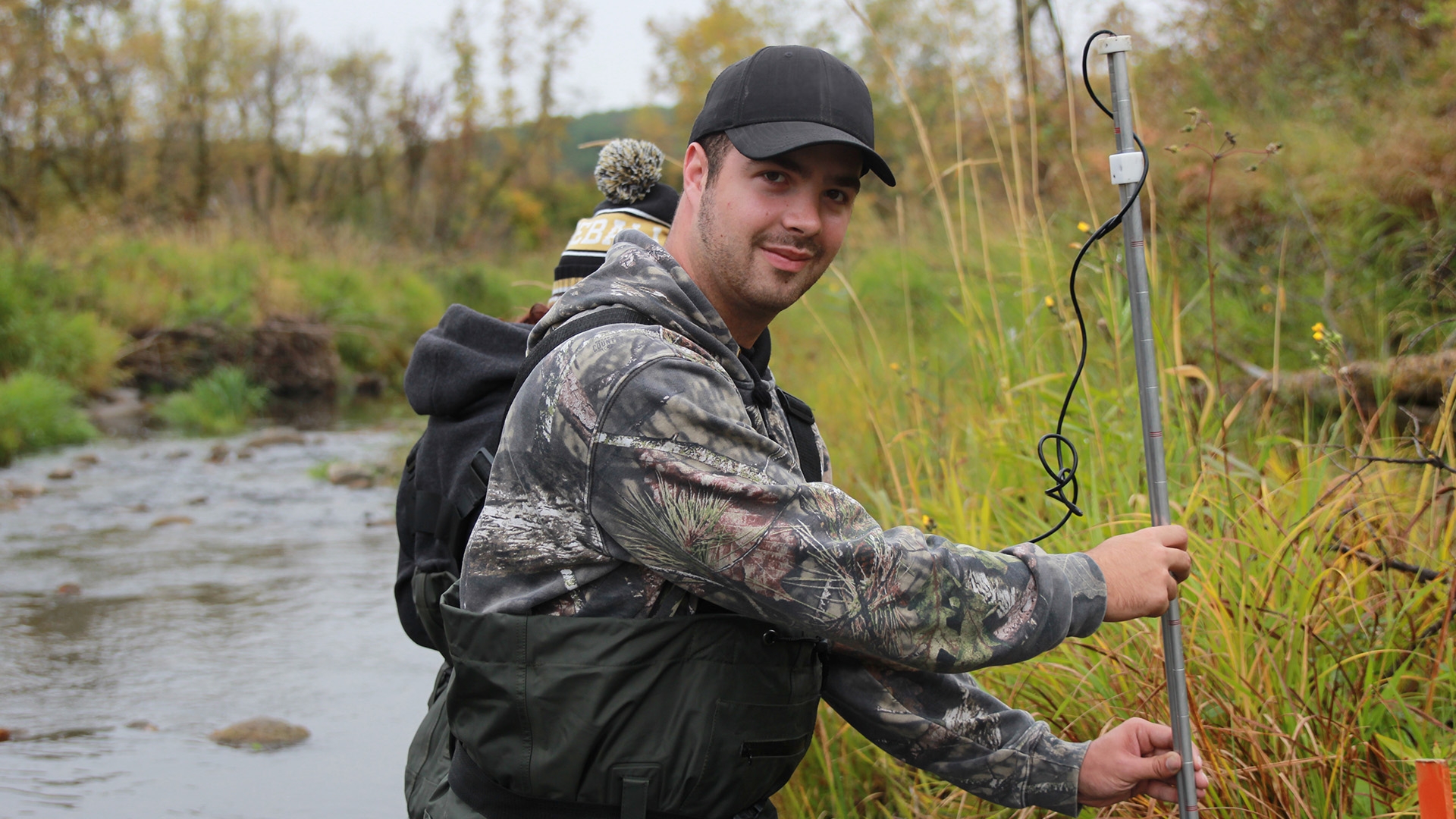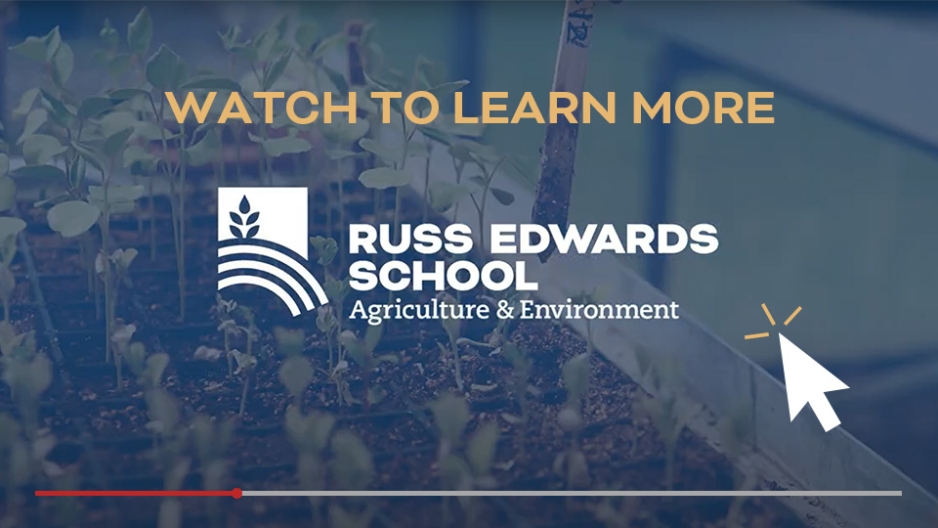Land and Water Management
Overview
Assiniboine’s two-year Land and Water Management diploma program prepares graduates for careers in land reclamation, environmental stewardship and rural planning emphasizing environmentally sustainable land management practices.
Students learn to work with landowners and other stakeholders to balance the realities of preferred land uses with conservation principles, environmental remediation and environmental monitoring. Learning and assessing how soils and water, alongside plants and animals, impact an ecosystem and its diversity and health sets the stage for the program capstone projects. The capstone has students working with industry partners to find solutions to specific local environmental challenges in balance with the land uses in that area.
Ready to take the next step?
Fill out the form below to receive more information about our program and related events.
Program Learning Outcomes
- Demonstrate a comprehensive understanding of environmental science, including principles of ecology, geology, hydrology, and soil science.
- Apply advanced skills and techniques for the monitoring, assessment, and management of land and water resources, including the use of GIS and other geospatial tools.
- Evaluate the environmental impacts of various land use practices, and develop strategies to mitigate negative impacts and promote sustainable land management.
- Analyze and evaluate the regulatory and policy frameworks governing land and water management, and develop strategies to navigate complex legal and regulatory environments.
- Design and implement environmental management plans, in collaboration with stakeholders, that promote sustainable land and water use practices.
- Apply techniques for land reclamation and restoration, including soil remediation, erosion control, and habitat restoration.
- Evaluate the economic and social implications of different land and water use practices, and develop strategies to optimize sustainable and equitable land use.
- Apply advanced techniques for water management, including water conservation, water quality monitoring, and water treatment.
- Evaluate the impact of climate change on land and water resources, and develop adaptation strategies to mitigate risks and promote resilience.
- Communicate effectively with diverse stakeholders, including landowners, policymakers, community members, and industry professionals, about land and water management issues and solutions.
- Apply principles of environmental ethics and sustainability to their work in land and water management
- Identify and address environmental risks and hazards associated with land and water management, using a proactive and preventive approach.
- Develop and implement effective strategies for rural planning and development, using principles of sustainability and community engagement.
- Identify and apply best practices for environmental stewardship, including the responsible use of natural resources and the promotion of biodiversity.
- Evaluate the effectiveness of different land and water management practices, using quantitative and qualitative methods, and continuously improve their skills and knowledge through ongoing professional development.
Examples of what jobs graduates from this program can do:
Graduates find jobs in conservation districts, non-governmental organizations, natural resource management organizations, agricultural organizations, resource extraction companies and all levels of government across the Prairies and beyond.
Success Factors
You might be a good fit for this program if you would enjoy:
- A career managing land and water resources, and ensuring their long-term sustainability
- Appreciate working outdoors in a variety of terrains and regions
- Learning how to incorporate sustainable land and water management practices across a variety of landscapes
- Collecting, organizing, and analyzing data to solve problems
- Interpreting and applying various acts, regulations, policies, and procedures
- Potential to work in a variety of urban and rural communities and different ecological settings
A valid driver’s license and access to a vehicle is strongly recommended given the need to travel for outdoor field lab activities and your work co-op placement.
The industry often requires individuals to:
- Be able and willing to travel.
- Possess a valid driver’s licence, and access to a vehicle.
- Work in outdoor settings in varied terrain.
- Ability to quickly problem solve and deal with stakeholder conflicts and complaints in a professional manner
- Have physical strength and stamina as well as the mobility and motor skills to undertake the required tasks.
- Operate equipment as required.
Interested in exploring similar program options?
We've got you covered! Here's another great program option to consider.
Admissions
Admission Requirements
- A complete Manitoba Grade 12 or equivalent
- English 40G/40S or equivalent
- Pre-calculus or Applied Mathematics 40S or equivalent
Applicants who have Mathematics 40G, Mathematics 301 or Consumer/Essential Mathematics 40S will be required to write a mathematics assessment test to assess their eligibility for admission.
If you received your education outside of Manitoba, please review the equivalent admission requirements: Interprovincial or International.
English is the language of instruction at Assiniboine. All applicants educated outside of Canada or in a country not on the test exempt list are expected to meet the English language proficiency requirements.
READY TO TAKE THE NEXT STEP IN YOUR EDUCATION JOURNEY?
Start your online application today and join Assiniboine College!
DON'T MEET ADMISSION REQUIREMENTS?
If you don’t meet admission requirements, visit our Centre for Adult Learning to upgrade courses.
Careers & Connections
Career Opportunities
- Compliance (conservation)
- Land use planning
- Water quality and quantity management
- Environmental consulting
- Wildlife management
- Environmental health and safety
- Watershed districts
Connections
Assiniboine has a number of agreements with other colleges, universities and professional organizations, making it possible to apply credit taken at Assiniboine to programs at other institutions. For information on agreements, see Articulation Agreements.
Upon completion of this program, graduates will have the following certifications:
- First Aid
Tools & Supplies
Our largest lab is the great outdoors! You take full advantage of moderate spring and fall conditions to study watersheds, habitat, fisheries and wildlife. Other classes are scheduled in computer labs, chemistry labs, soils and crops labs and regular classrooms. You use GIS software, computers and environmental monitoring equipment to study air, water and land conditions.
Our classrooms, labs and shops are equipped with the necessary equipment that you need to make the most of your experience. However, there are some tools and supplies that you will need to purchase for personal use to help you with your studies. Much of what you purchase you’ll be able to use after you graduate and begin your career.
Program Checklists, Textbooks, and Supplies
ASSINIBOINE BOOKSTORE
Textbooks, supplies and uniforms may be purchased at the Assiniboine Bookstore at the Victoria Avenue East Campus. Booklists, tool lists and supply lists are available from your school office 30 days prior to the start date of your program.
Technology Requirements
Students in this program are required to bring their own laptop for use on-campus. The laptop must meet the technical needs outlined by the program. MAC computing devices are not compatible with program software. See Technology Requirements for detailed information.
Courses & Costs
Costs
Estimated Program Costs (Domestic students)
| Year 1 | Year 2 | |
|---|---|---|
| Credits | 75.0 | 60.0 |
| Tuition | $4,820 | $3,660 |
| Course Fees | $1,850 | $2,170 |
| Students' Association fees (including Health Premium) | $705 | $615 |
| Estimated textbooks, tools, and supplies | $970 | $440 |
All fees are estimated and subject to change without notice.
Estimated Program Costs (International students)
| Year 1 | Year 2 | |
|---|---|---|
| Credits | 75.0 | 60.0 |
| Tuition | $20,350 | $16,080 |
| Course Fees | $1,850 | $2,170 |
| Students' Association fees (including Health Premium) | $705 | $615 |
| Required Health Insurance | $825 | $825 |
| Estimated textbooks, tools, and supplies | $970 | $440 |
All fees are estimated and are subject to change without notice. All international students must purchase health insurance. The college adds this fee to your student account and then sends your name and fee to the insurance provider on your behalf.
For more information, visit the Fees and Charges page.
Courses
To graduate with a Land and Water Management diploma, students must successfully complete 120 academic credits and 15 practical credits. The minimum passing grade for each course is indicated on the course outline. Course offerings are subject to change and may vary by intake.
Year One Courses
| Title | Credits/CEUs | Elective | Distance | PLAR |
|---|---|---|---|---|
1st Aid - Emergency (HLTH-0030)Basic First Aid and CPR techniques taught in an interactive environment for individuals and employees who want an overview of First Aid and CPR in the workplace or home. The course covers skills needed to recognize, prevent and respond to cardiovascular emergencies for adults, CPR and other topics such as choking, airway and breathing emergencies, and prevention of disease transmission. This course meets the minimum regulations for Workplace Health and Safety for Basic First Aid. Participants who meet the required standard receive a nationally recognized certification that is valid for three years. |
0 credit(s) | No | No | No |
Agro-Ecology Field Laboratory (AGRC-0162)This course introduces students to key features, challenges and sustainable management of the prairie agro-ecological landscape systems. Based on various field and laboratory exercises and guided site tours, this course provides hands-on training to students by introducing them to various agricultural and environmental sites discussing origin, development and classification of soils, water resources, wetlands and river dynamics, crop agronomy and weeds identification, wild-life habitat, forestry and shelterbelts, the Dominion Land Survey (DLS), mapping and Global Positioning System (GPS), agricultural equipment and livestock production. |
6 credit(s) | No | No | No |
Aquatic Ecosystems (ENVR-0044)In this course, students are introduced to water resource terminology and technology. The course examines the interconnection of land and water and the interdependence of the activities upon these resources. Topics include watersheds, physical landforms, wetlands, riparian areas, water quality risks and issues, water controls and integrated planning. Students gain experience in sampling and evaluating water quality, and interpreting water analysis reports. |
6 credit(s) | No | No | No |
Co-op Work Placement - LWMGT (COOP-0021)Prerequisites: PEDV-0313 Professional Development, SCIE-0038 Plant Physiology and Taxonomy, AGRC-0291 Terrestrial Ecosystems, ENVR-OO37 Soils and Water, plus cumulative weighted grade point average (CWGPA) of 2.0 or greater. |
15 credit(s) | No | No | No |
College Foundations (PEDV-0356)This course improves students' ability to navigate the college experience and environment, including student's rights, roles, and responsibilities. In this course, students reflect on their skills, attitudes, and expectations and develop learning strategies to help them to become successful, resilient, and self-directed learners. The course covers topics such as success in online learning, time management strategies, learning strategies, assessment taking strategies, academic integrity, information and digital literacy, and wellness, among others. It integrates elements of student orientation. |
0 credit(s) | No | No | No |
Communications and Technology (COMP-0571)This course will help students communicate better in the work world. Using technology as a communication tool, students will learn to write, present, organize and interpret data, and interact with the online world. |
6 credit(s) | No | No | No |
GIS Applications (GEOS-0022)This course provides learners with the concepts, principles, and theories behind Geographic Information System (GIS) fundamentals and digital mapping, including GIS theory, cartography, database, and the ArcGIS suite of software applications. The goal of this course is to understand GIS as a useful and flexible tool that can be used to address and solve a wide range of everyday resource management questions and problems. Students will also learn how to design and export GIS maps, explore Web Mapping Applications and complete basic analysis. The course is composed of two components: lectures and labs. The lectures will discuss the GIS theory and concepts while labs reinforce concepts through hands-on experience in defining and analyzing real world problems using a variety of GIS analytical techniques. Topics include spatial data, digital mapping and interpretation, analysis and basic remote sensing. |
6 credit(s) | No | No | No |
Natural Resources Technology (COMP-0572)This course provides learners with the concepts, principles and theories behind a variety of technology used by resource management organizations. Students will learn the applications of field-based and mapping technology used by the industry. Both spatial and non-spatial data systems will be covered providing fundamental knowledge to enable learners to interact and provide basic services to organizations and specialists. Topics will provide theory and hands-on proficiency in GPS and surveying equipment, data collection procedures, as well as data accuracy, analysis, and processing. Learners will use software to download, manage, summarize, map and report on field-collected data. |
6 credit(s) | No | No | No |
Plant Physiology and Taxonomy (SCIE-0038)The morphological, anatomical, and physiological characteristics of vascular plants within the Aspen Parkland and Boreal Forest are the foci of this course. Emphasis is placed on using appropriate terminology to identify and classify flora within local communities. Field trips and lab work provide opportunity for students to recognise common plant families and use taxonomic keys for identification. Habitat, ethnobotany, and plant ecological relationships supplement plant identification and classification. |
6 credit(s) | No | No | No |
Professional Development (PEDV-0313)This course prepares students to perform at a high level as stakeholders in the agriculture and environmental industries. Topics include preparing for and understanding the workplace, striving for performance, interacting efficiently, and sharing the organizational vision. |
6 credit(s) | No | No | No |
Soils and Water (ENVR-0037)Prerequisites: AGRC-0162 Agro-Ecology Field Laboratory, ENVR-0044 Aquatic Ecosystems |
6 credit(s) | No | No | No |
Statistics for Life Sciences (MATH-0072)This course provides students with an overview of graphing and sampling distributions, probability and inference, regression and correlation. It also provides an introduction to the principles of experimental design and the techniques of analysis of variance in a manner that emphasizes and illustrates the real-world aspects of statistical analysis. Students gain an understanding of estimation and hypothesis testing, design of experiments, analysis of categorical data, analysis of covariance and data management. |
6 credit(s) | No | Yes | No |
Terrestrial Ecosystems (AGRC-0291)Prerequisite: AGRC-0162 Agro-Ecology Field Laboratory |
6 credit(s) | No | No | No |
Year Two Courses
| Title | Credits/CEUs | Elective | Distance | PLAR |
|---|---|---|---|---|
Ecology (SCIE-0039)Prerequisites: AGRC-0291 Terrestrial Ecosystems, ENVR-0044 Aquatic Ecosystems, MATH-0072 Statistics for Life Sciences |
6 credit(s) | No | No | No |
Environmental Capstone 1 (ENVR-0047)Prerequisites: COMP-0571 Communications and Technology, GEOS-0022 GIS Applications |
6 credit(s) | No | No | No |
Environmental Capstone 2 (ENVR-0048)Prerequisites: ENVR-0047 Environmental Capstone 1, ENVR-0042 Environmental Legislation, SCIE-0039 Ecology |
6 credit(s) | No | No | No |
Environmental Chemistry (ENVR-0045)This course introduces students to the chemistry of the environment from a natural and anthropogenic perspective. The purpose is to provide students the chemical basis for understanding the environment and environmental problems. Topics of study may include, stratospheric chemistry and ozone depletion, ground-level air pollution, the natural and cultural greenhouse effect, heavy metal poisoning, acid rain and waste disposal. |
6 credit(s) | No | No | No |
Environmental Legislation (ENVR-0042)This course introduces environmental and natural resources related legal principles and legislation in Manitoba. The course will review the rationale for environmental law, major legislation, significant relevant Indigenous law, environmental assessment and hearings. |
6 credit(s) | No | No | No |
Environmental Topics (ENVR-0046)Students explore current issues and trends on local, regional and global scales, which are related to an array of ecological, biological, agricultural, technological, economic, social, political and other issues associated with a growing human population. The focus is on how individually and collectively we impact, positively and negatively, the quality of our environment and human living conditions. Students are challenged to use a multi-perspective approach to assess natural resource issues. |
6 credit(s) | No | No | No |
Fisheries/Wildlife Management (ENVR-0039)Prerequisite: AGRC-0291 Terrestrial Ecosystems, ENVR-0044 Aquatic Ecosystems |
6 credit(s) | No | No | No |
Natural Resources Field Lab (AGRC-0292)Prerequisites: AGRC-0162 Agro-Ecology Field Laboratory, COMP-0572 Natural Resources Technology |
6 credit(s) | No | No | No |
Reclamation and Remediation (ENVR-0036)Prerequisite: ENVR-0037 Soils and Water |
6 credit(s) | No | No | No |
Socio-Environmental Management (ENVR-0040)Ecological and social dynamics influencing natural resource and environmental management are studied via readings, case studies, and discussions. Students explore theories and methods used by natural resource professionals to engage stakeholders. |
6 credit(s) | No | No | No |





